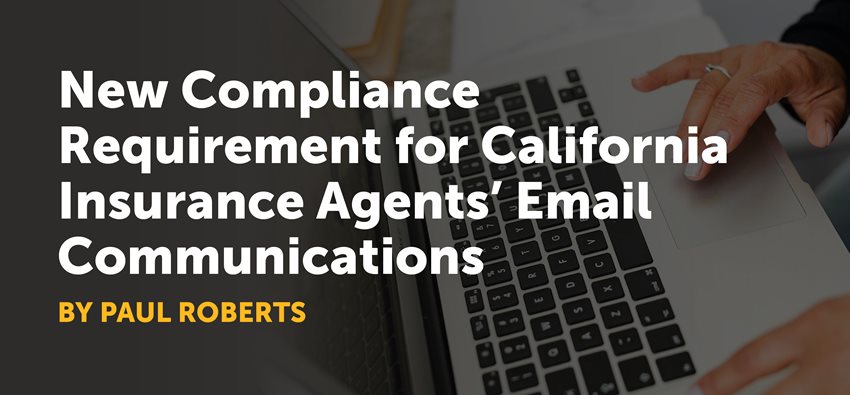New Compliance Requirement for California Insurance Agents’ Email Communications

Under new California law (SB 1242) effective January 1, 2023, California insurance agents are required to list their insurance license numbers on all email communications.
Existing California law from the mid-1990s requires insurance agents to print their license numbers on business cards, quotes, and print advertisements. SB 1242 applies these same requirements to agents’ electronic mail correspondence involving any activity for which a license is required beginning in 2023. This allows consumers to confirm that the person and/or agency is actively licensed with the California Department of Insurance.
While the law applies to California insurance agents with accident and health or sickness licenses, it also applies to other California insurance licensees such as property and casualty, life, disability, annuity, personal, auto, etc.
In late December 2022, the California Department of Insurance clarified some of its new requirements in a new FAQ document:
- The law applies to every email that involves an activity for which a person/agency must be licensed – regardless of where the emails are sent from or to. The law does not apply to electronic correspondence regarding clerical activities that do not require a California insurance license.
- The license number must appear adjacent to, or on the line below, the individual’s name or title.
- The license number must be in a font size that is no smaller than the largest font of any street address, email address, or telephone number of the licensee included in the e-correspondence. For example, if an email includes a 10-point street address, an 11-point email address, and a 12-point telephone number then the license number must be at least 12-point.
- The agent must list the California Department of Insurance license number. An agent cannot list a National Producer Number (NPN) in lieu of a California license number. Furthermore, California DOI clarifies that an agent cannot list a hyperlink under the agent’s name that links to a website listing the license numbers for every state where the licensee is licensed (which would include California).
- If an individual licensee sends an email while working for a licensed agency, and both the individual’s and the agency’s names appear on the email, then both license numbers are to be included in the email.
- If an individual licensee sends an email while working for two or more licensed agencies, that agent’s email must include the individual’s license number and the license number of every agency whose name appears on the email.
- Explanations or interpretations of, and offering of opinions or recommendations on, insurance coverages, exposures, limits, premiums, rates, deductibles, payment plans, or any other insurance contract, or potential insurance contract or terms
- Recommending, advising, or urging applicants for insurance coverage, potential applicants for insurance coverage, or policyholders to buy particular insurance policies or to insure with particular companies or insurers
- Binding of insurance coverages
- Solicitation
- Negotiations preliminary to execution
- Execution of a contract of insurance
- Transaction of matters after the execution of a contract and arising out of it
- Distribution of brochures, business cards, or general information advertising insurance agencies, insurers, insurance products, insurance services, etc., provided that unlicensed persons do not analyze, give advice, or make recommendations concerning insurance contracts or potential insurance contract terms to applicants, potential applicants, or policyholders.
- Preparation of applications for insurance coverage without any contact with applicants
- Obtaining underwriting information from third parties
- Preparation of binders, certificates, endorsements, ID cards, policies, and similar evidences of insurance, under the supervision of licensees and for the review and signature of licensees, provided that the unlicensed persons are not signing such documents, either in their names or in the names of the licensees.
Note: this law only applies to California licenses – both resident and non-resident. It does not apply in other states, though other states may follow California’s direction in future law(s).
Most Recent Articles
Carrier Updates
Carrier Updates

